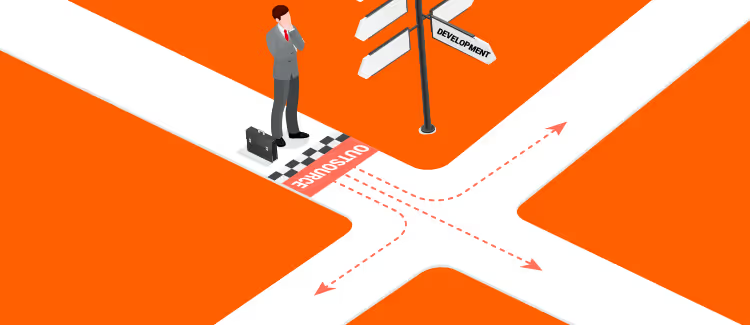
"It is change, continuing change, inevitable change, that is the dominant factor in society today. No sensible decision can be made any longer without taking into account not only the world as it is, but the world as it will be.” – Isaac Asimov.
Today’s fast paced world and rapidly changing human needs call for the best of products that add several layers of convenience to the lives of people. Failure to meet time to market commitments in terms of offering the right product may result in business loss. That is a big bad news which you don’t want to hear. So, either brace for impact or choose the right development partner.
But first, let’s clear some air. A good product is the one that offers value, and companies must stay on top with the right product offering. That makes product development a dynamic function as even the product requirements vary based on industry, businesses type and so on. Hence, companies must be careful in evaluating a partner for outsourced product development.
The partner should be aligned with the larger goal of the company and aid its expansion, brand value, profitability, among others. Choosing a trustworthy development partner can be quite a task. While picking one, companies must ensure that the partner echoes the company’s voice like they do.
5 Steps to choose the right partner for outsourced product development
- Check their capabilities
The entire premise of outsourcing a project is that you do not have the capabilities, skills or bandwidth to implement it inhouse. So, first you need to check if your development partner has it. Few questions to ask and get started –
- Is your partner capable of implementing the technical project that you plan to outsource – Be it mobile application development, web development or any tech product or platform.
- What is your partner’s experience in successfully completing a similar project on time?
- What type of clients have they worked for in the past?
- Do they only handle local projects or have experience working with offshore clients?
- What is their development process, team composition and skillset?
These questions help you evaluate your partner’s capabilities. Along with these volleys of questions, run a background check on the partner. Look at the client testimonials, talk to the past clients and take their feedback. If your product development needs a big team, then check the company’s team size and its credentials.
If your requirement can be handled by an individual, then look out for freelance developers. However, companies are more responsible and take stock of the status quo than freelancers. The reliability factor becomes critical when you send multiple task requests and the individual may struggle to live up to the expectations or scale as per the requirement.
- Define, Define, Define
Everything starts by defining your business objectives. The first step in outsourcing the product development to a partner is to make him fully aware of your exact requirement. Then make him clear of the business goals and your expectations from the partnership.
It’s better to document everything and have a clear scope of work document outlining detailed deliverables for each activity. Define the milestones and checkpoints, define a review and communication protocol. Define the terms of engagement via a contract or agreement which adds a legal binding to the entire process.
- Check Scalability
Whenever you are taking a plunge into product development, think of the growth potential and the array of features that can be incorporated into it. The partner should be able to scale up as needed to align with your vision.
The company or the freelance developer should be able to build a scalable product and make timely upgrades and enhancements. This aids in the company expansion in future when it adds multiple offerings to its basket. Like the Facebook or Instagram way of bringing so many features after its initial launch.
So, the build and code must be modular, backward compatible and easy to adapt and integrate with the new elements that are added later on. The right partner for you is the one who can handle various business needs and build a product that’s scalable in the long run.
- Perform Regular Assessments
At the start of the project, mention the delivery timelines and assess the performance accordingly. Freelance developers work on a bunch of projects and, at times, their prioritization can go for a toss leading to a delayed delivery cycle.
Your company should have clear directives to combat such situations. Define the key performance indicators for your partner and list them down while signing the contract. This leaves no scope for any differences in the later stage of the project. Tie in the payment with the performance assessment. This brings an element of seriousness to your partner and that shows in the product development.
In simpler terms, this is akin to trying out new clothes and apparel before purchasing them or subscribing to the trial version of the software before making the purchase. Yes, no one wants to get disappointed once the partner is on board. So, it’s better to be safe than sorry!
- Post Development Support
Product development is half the journey and the remaining half comprises of the support. Then only the product can cross the finish line. There can be breakdowns, glitches, bugs, upgrades after the product release and the partner must handle all these efficiently.
The developers should maintain a quick turn-around-time so that the company garners more happy and repeat customers. Remember, a bad service is a customer lost and a relation shot. And going with the classic line of “customers bringing more customers”, your business can’t afford to do that.
After-sales support is the key to build long lasting customer relations and the outsourced partners should be able and willing to go full throttle to address your needs. That’s the proverbial cherry on top of your product cake! If you have these basic check points in place, you are on track to hire a team that’s best in the trade to take up your next project.



